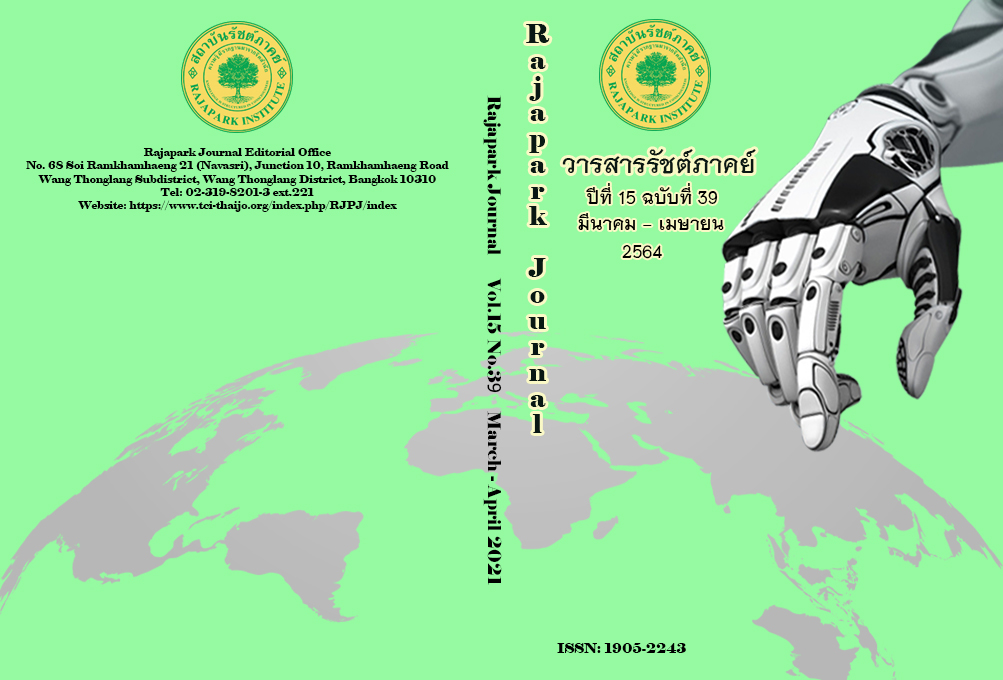Instructional Leadership of School Administrators Affecting Effectiveness of Internal Quality Assurance in Bannang Sata Cluster under Yala Primary Educational Service Area Office 2
Main Article Content
Abstract
The purposes of this research were (1) to study the instructional leadership of school administrators; (2) to study the effectiveness of internal quality assurance; and (3) to study the instructional leadership of school administrators that affect the effectiveness of internal quality assurance, in Bannang Sata Cluster under Yala Primary Educational Service Area Office 2. The population consisted of teachers of the schools. The samples were 118 informants. The research instrument was a questionnaire. The reliability was 0.887. The statistics used to analyze the data were percentage, mean, standard deviation and stepwise multiple regression analysis. The results of the research were as follows: (1) The levels of the instructional leadership of school administrators, overall and specific was in the high level, the Managing Curriculum and Instructional were ranked the highest, followed by the Promoting Instructional Climate, the Monitoring of Teacher Performance and the Supervising Teaching were in the lowest rank; (2) The levels of the effectiveness of internal quality assurance, overall and specific was in the high level, the Quality of Learner was ranked the highest, followed by the Student-Centered Teaching and Learning and the Administration and Management were in the lowest rank; (3)The instructional leadership of school administrators which affect in the effectiveness of internal quality assurance, there was only one component: Monitoring of Teacher Performance. The effective to predict accounted for 25.40 percent.
Article Details

This work is licensed under a Creative Commons Attribution-NonCommercial-NoDerivatives 4.0 International License.
Views and opinions appearing in the Journal it is the responsibility of the author of the article, and does not constitute the view and responsibility of the editorial team.
References
Atiwitthayaporn, J. (2011). Principle and Theory of Educational Administration (2nd ed.). Songkhla: Thanksin University.
Boonbai, P. (2020) Instructional Leadership of School Administrators Affecting Effectiveness of Internal Quality Assurance in Schools under Sakon Nakhon Primary Educational Service Area Office 1. Master of Education (Education Administration). Sakon Nakhon Rajabhat University.
Bossert, A. (1988). Leadership in organization. Eagle wood Cliffs, NJ: Prentice Hall.
Bureau of Education Testing. (2018). Guidelines for Quality Assessment according to Educational Standards - Primary Level, Basic Education Level and Special Education Level. Bangkok: The Agricultural Co-operative Federation of Thailand Printing.
Fukyaem, C., Sutanithi, M., & Sethakajorn, S. (2017). The Model of Instructional Leadership Effectiveness of School Administrators Nonthaburi Provincial Administrative Organization. SWU Educational Administration Journal, 14(26), 130-139.
Hallinger, P., & Murphy, J. (1985). Assessing the instructional leadership behavior of principals. Elementary School Journal, 86(2), 217-247.
Hengyodmak, M., & Eungpuang, A. (2016). Instructional Leadership of School Administrators Affecting the Effectiveness of Private School in Buriram. Journal of Education Khon Kaen University, 10(4), 112-118.
Hoy, A. W., & Hoy, W. K. (2003). Instructional Leadership: A Learning-Centered Guide. Boston: Allyn and Bacon.
Hoy, W. K., & Miskel, C. G. (1991). Educational administrations: Theory research and practice (4th ed.). New York: McGraw-Hill.
Junlawan, V. (2004). A Factor Analysis of School Principals Instructional Leadership of Saraburi Primary Education Office. Master of Education (Educational Administration). Phranakhon Si Ayutthaya Rajabhat University.
Kasa, B. (2017). Instructional Leadership of School Administrators in Krongpinang District under Yala Primary Educational Service Area Office 1. Master of Education (Educational Administration). Yala Rajabhat University.
Kheowsri, P. et al. (2005). Model for Instructional Leadership Behavior Development of School Managers in Basic Education Level. Bangkok: NIDTEP.
Krejcie, R. V., & Morgan, D. W. (1970). Determining Sample Size for Research Activities. Educational and Psychological Measurement. 30, 607- 610.
Krug, S. E. (1992). Instructional Leadership: A Constructivist Perspective. Educational Administration Quarterly, 28(3), 430-443.
Maharutsakul, P. (2010). How to increase work efficiency?. For Quality Magazine, 17(151), 109-112.
McEwan, E. K. (1998). Seven steps to effective instructional leadership. California: Corwin Press.
Meechai, W., Ariratana, W., & Tuksino, P. (2011). Instructional Leadership Affecting Academic Administration in the School under the Khonkaen Provincial Administrative Organization. Journal of Education Khon Kaen University, 5(2), 79-85.
Ministry of Education. (2008). The Basic Education Curriculum 2008. Bangkok: The Agricultural Co-operative Federation of Thailand Printing.
Phrakhru Dhammathornchaiwichit Chayabhinundho. (2019). Academic Leadership Component: Buddhist Leadership. Journal of Dhammawit, 2(2), 347-352.
Prasitratthasin, S. (2013). Applications of Statistical Methods in Research (6th ed.). Bangkok: Samlada.
Reynolds, D., & Creemers, B. (1990). School Effectiveness and School Improvement: A Mission Statement. School Effectiveness & School Improvement, 1(1), 1-3.
Sergiovanni, T. J. (1987). Education Governance and Administration (2nd ed.). New Jersey: Englewood Cliffs.
Silpcharu, T. (2012). Research and Data Analysis with SPSS and AMOS Statistics (13th ed.). Bangkok: Business Research & Development Institute.
Suteethon, T., Thepsaeng, S., & Burasiriluk, S. (2016). Academic Leadership of Modern Teachers. SWU Educational Administration Journal, 13(24), 54-61.
Waewanchit, P., Disathaporn, C., & Putiariyawat, J. (2019). Academic Leadership of school Administrators Affecting Learning Organization of Educational Institutions in the Bangkok Metropolitan Thungkhru District Office. SWU Educational Administration Journal, 15(29), 1-10.
Wildy, H., & Dimmock, C. (1993). Instructional leadership in primary and secondary school. Journal of Educational Administration, 31(21), 43-61.


